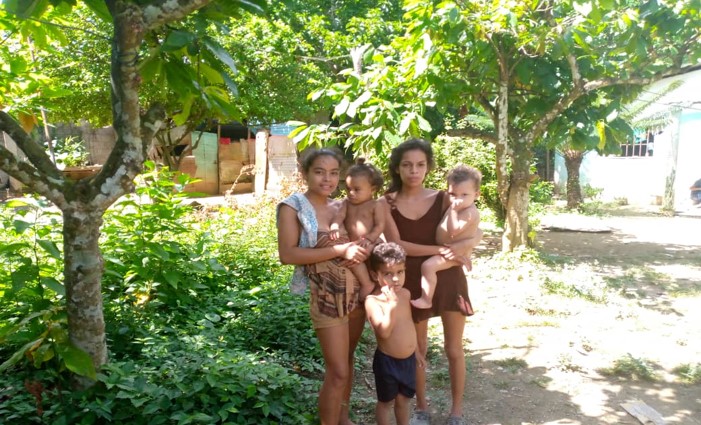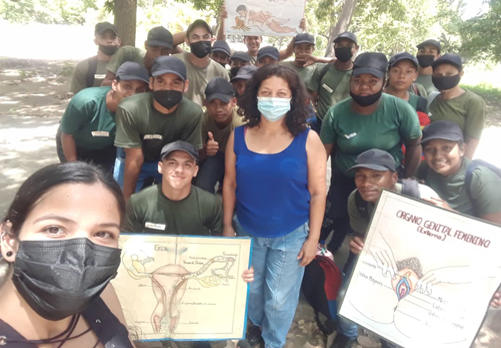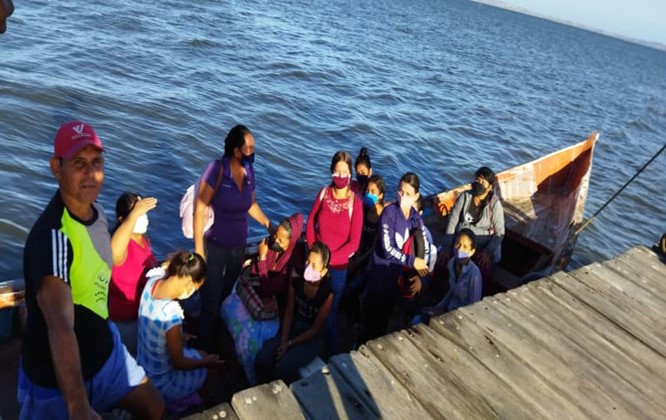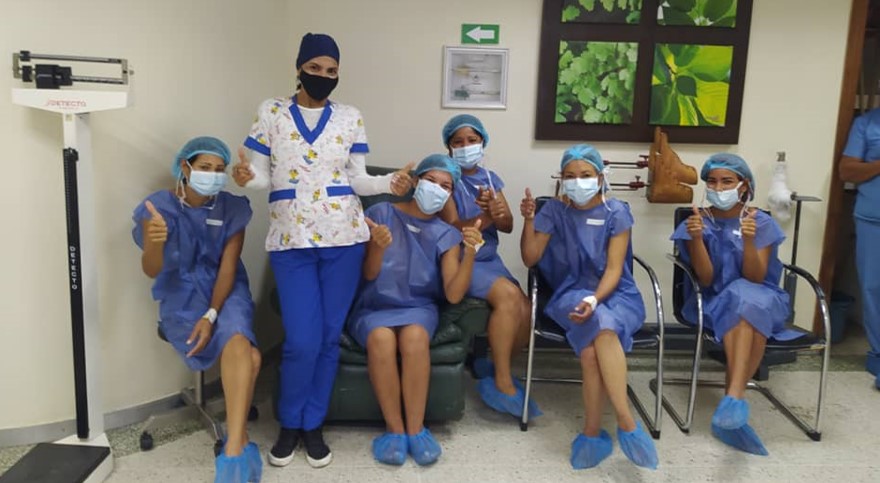Enabling choices, changing lives: Q&A with Turimiquire Foundation
Written by Olivia Nater | Published: December 15, 2022
Through our Global Partners program, Population Connection supports a growing number of grassroots organizations around the world working to increase access to education, public health and family planning services. Their efforts make a vital difference in their local communities and represent the “final step” in our shared work to make the world a more just and sustainable place for everyone.
Get to know our wonderful partners in this Q&A series! Turimiquire Foundation President and Co-Founder Steven Bloomstein tells us all about the organization’s work to help Venezuelan families take charge of their fertility, educate their children, build community, and gain access to life-changing medical and humanitarian aid. Turimiquire was founded in 1996 with a mission to improve the lives of the marginalized rural populations of northeastern Venezuela by offering a range of programs focused on reproductive health and family planning, public education, rural livelihoods, and the environment, to help them emerge from centuries-long cycles of poverty.
What prompted you to start your organization?
Our story begins in the early 1970s. We were a small group of North Americans who had just graduated from college and were idealistic enough to think we could change the world. To pursue our dreams of living simpler, healthier lives “off the grid,” we relocated to the northeastern state of Sucre in Venezuela to pursue tropical fruit farming. We found a beautiful remote tropical river valley typical of the impoverished hinterlands along the South American Caribbean coast, far outside of any tourist maps.
The small farm we took over (once a hacienda but long since abandoned) was a three+ hour hike from the nearest road, meandering up a winding foot trail that crossed the river seven times before reaching our farm. We built and lived in simple mud-and-thatch roof huts, pulled water from the nearby river, and eventually installed solar panels/electricity.
We quickly became embedded in the local campesino (country) culture. Far removed from public sanitation, medical care, and social services, our campesino neighbors — while living in what many of us might consider a tropical paradise — were and are, by standard economic indicators, extremely poor, generating barely enough income to feed and clothe their large families.

When we first arrived in this campesino valley, illiteracy was the norm. Girls often had their first child at 14 or younger, giving birth to a new baby every other year, so that it was not uncommon for a 30-year-old woman to have had seven or eight kids and several miscarriages and/or infant deaths, and to have another on the way. Women often went for years from one pregnancy to the next without experiencing menstrual periods. Maternal and infant mortality and morbidity were prevalent facts of life. Women aged and died relatively young from this life on the reproductive treadmill. The men led hard, physically demanding lives providing for their large families.
At first, we informally helped in as many ways as we could, using our own personal resources. We provided employment at our homestead farm, funded community projects, and reached out to families with reproductive health and family planning, emergency loans, school supplies, housing, vaccination of farm animals, medical support, and solar panels for rural electrification. As word-of-mouth spread, the request for our services grew exponentially.
In 1994, tragedy struck — our dear neighbor Brunilde died from post-partum hemorrhaging, giving birth to her seventh child at the age of 31 in a small mud hut hours from the nearest road. Brunilde died while being carried down rocky foot trails and across mountain rivers in a blood-drenched hammock, in a desperate attempt to get her to the road and then to the local hospital in time to save her life. Her newborn died shortly thereafter.
At the time, we had been trying to get Brunilde a tubal sterilization through our nascent connections in the Venezuelan public health system. She became pregnant again while waiting — literally two years — for the procedure.
Brunilde’s untimely death became our wake-up call.
In 1995, we formalized our family planning and community efforts with a U.S.-based non-profit and expanded the programs we were already personally financing. We incorporated the Turimiquire Foundation in the state of Massachusetts as a private operating foundation and received our non-profit 501(C)(3) tax-exemption status from the U.S. Internal Revenue Service. We have been delivering vital reproductive health, educational, and other services ever since, measurably improving quality-of-life in our catchment area.

What programs or projects are you currently working on?
The Turimiquire Foundation offers a services methodology that we call our “Recipe for a Thriving Community.” It is a demonstrated, cohesive four-step blueprint for delivering maximum value in human services, based on 40+ years living and working with Venezuela’s impoverished populations. The Recipe is based on years of responding to what low-income families have told us that they need, in this order:
- Family Planning: Offer women and men the ability to manage their fertility. This is step one and the key foundational service.
- Education: Offer families real educational opportunities for their children. Once families can manage their fertility, they invariably turn to education as the next step in improving their lives.
- Community: Support infrastructure development, eco-agriculture, and sustainable livelihoods. Productive work with a promising future.
- Humanitarian Aid: Provide critical assistance in Venezuela’s current crisis. Life-saving medical and humanitarian support when families have nowhere else to turn.
We offer the Recipe as a replicable operating model for other NGOs working in the field. We believe that in the crucible of community-based on-the-ground foundations like ours, some of the most innovative solutions for human and environmental progress are being forged today.
What do you hope to achieve in the next five years?
Our Recipe responds, first and foremost, to the widely-documented unmet need in Venezuela for family planning services and reproductive health education, focusing on marginalized rural populations in the north-eastern Caribbean state of Sucre.
Our first mission is to provide immediate relief to the majority of women and men of reproductive age who otherwise have few options to manage their fertility. To witness the quandary that this places families into — and to observe the consequences for mothers, adolescents, and children who cannot control their destinies — is to understand this urgency above all else.
Our second objective is to build a family planning services infrastructure that bridges the public and private sectors, providing adolescents and families with reliable options to plan their families and their lives. We seek to create long-term service delivery that will also serve as a public-private health care model as the country moves forward.

We focus on two marginalized groups: rural women and their families; and adolescents. We want to educate them as to their options and then put those options at their disposal. These participants will then showcase these benefits to others in the same situation, an effective multiplier effect which we have long experienced in our work.
What have been some of the greatest challenges you have faced?
Delivering services in our region (and in most of Venezuela) is hugely challenging. There is nothing abstract or vague about these problems in a country immersed in ongoing socioeconomic and humanitarian crises:
- The COVID-19 pandemic (now with lessening impact)
- A bankrupt economy, ongoing collective impoverishment
- Persistent failures and deficiencies in electric service, internet, and telecommunications
- Chronic water shortages that sometimes run for days at a time
- Shortages of gasoline and diesel (and cooking gas), severely impacting public and private transportation
- A local currency destroyed by hyperinflation that has decimated purchasing power. The U.S. dollar is now the main purchasing currency. Without an adequate banking system to support it, this leads to a jury-rigged cash economy.
- Crime — carrying and using USD cash for transactions brings the constant threat of robbery in an environment where poverty prevails.
- Severe collapse of public services, both in health and education. It is difficult to overstate the severity and impact of this on low-income Venezuelans.
- Deficient urban waste collection and street cleaning, leading to unhygienic public environments
- Medicines, including contraceptives, now less scarce but expensive
- Intensifying rainy seasons (possibly due to climate change) have dramatically impacted our rural activities, with extensive flooding and impeded rural transportation. Urban areas are unprepared and flood as well.
- Serious personal insecurity limits our public activities, poor institutional security limits our private entity activities, and corrupt judicial and police protection offers little reassurance when problems occur.
All of our family planning and other activities function within the context of these limitations. This results in more delays, more effort, and hence more costs, to achieve any given result. One does not so much overcome these obstacles as continually work around them. We are impressed by and grateful for how effective and innovative our staff are under these circumstances.
What are you most proud of?
We are most proud of what we have done on the ground with high efficiency and low overhead.
- Family Planning: From January 1997 through November 2022, we delivered 238,000+ Couple Years of Protection (CYPs), the metric by which USAID measures family planning achievement, directly serving more than 75,000 rural women and families. We have also offered more than 4,000 educational Reproductive Health Workshops to more than 72,000 student and young adult participants.
- Humanitarian medical program: We have facilitated more than 25,000 consultations in family medicine including gynecological and prenatal consultations, ultrasounds, pap smears, ophthalmological, cardio-vascular, ENT and internal medicine, x-rays, CT-scans, diagnostic procedures, and biopsies as indicated. Through November 2022, we had performed a total of 1,240 surgeries including out-patient hernia repairs, emergency cesareans, hysterectomies, mastectomies, and orthopedic interventions requiring hospitalization, all for low-income patients who can no longer count on the public health sector.
- Rural Education: Once campesino parents (often semi-literate themselves) can manage their fertility, they become passionate about giving their children the best possible future through schooling. In response, we have improved literacy in our valley: 500+ students have now attended high school with our support, and some 30 of these graduates have attended college! Some who have graduated as nurses and teachers continue to work with us as professionals in their rural communities.
- Eco-agriculture: Eco-agricultural practices are core to our work, including the successful introduction of fruit trees with commercial promise, such as durian, mangosteen, and jackfruit. We support tree farming for the tropics, a viable alternative to the erosive “slash-and-burn” practiced for centuries among growing populations and resulting in widespread deforestation and poverty. We have also implemented the use of solar energy and gravity water delivery systems for the remote hill communities that we serve, far from the public services grid.

Anything else you’d like to share with Population Connection members?
Think globally. Act locally.
We were originally inspired by the International Conference on Population and Development (ICPD) held in Cairo, Egypt, in 1994, where some of the first visionary plans were publicly proposed to respond to the planet’s most pressing issues, including slowing unsustainable regional population growth, reducing inequities within societies, and empowering women. This agenda then evolved into the United Nations Millennium Development Goals (MDGs) for 2015 and currently into the 17 Sustainable Development Goals for 2030. We are honored to be part of this effort.
We think that multi-sector community-based Population, Health, and Environment initiatives (PHE) — such as our own Recipe for a Thriving Community — should be encouraged as local development models for the developing world.
We deeply thank Population Connection for understanding and supporting our work.
To learn more about Turimiquire Foundation, visit their website, sign up to their newsletter, and follow them on Facebook!

